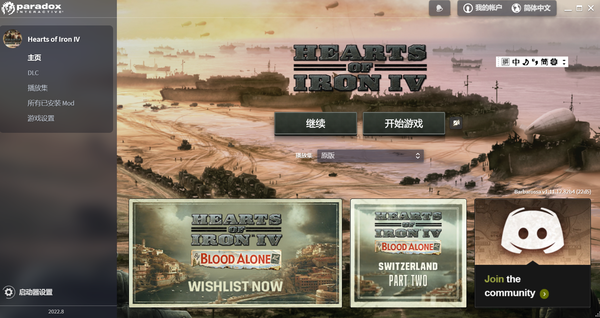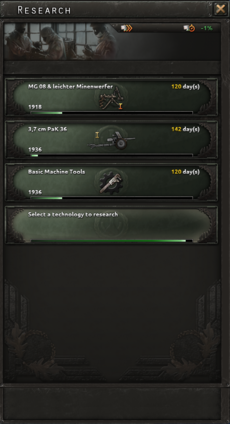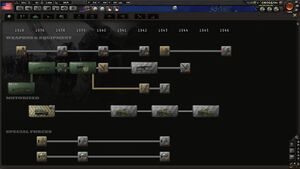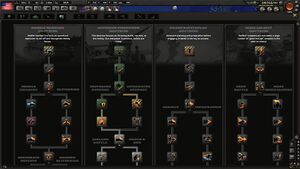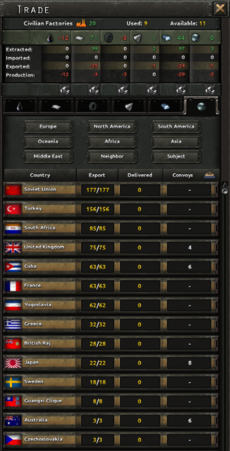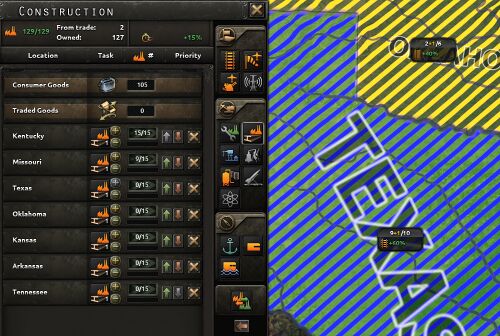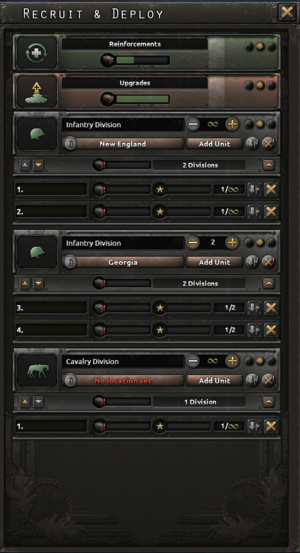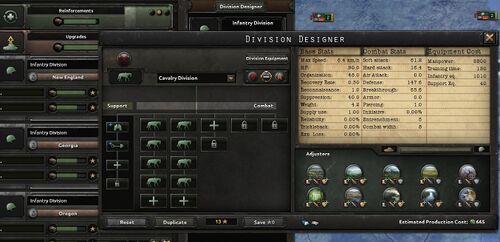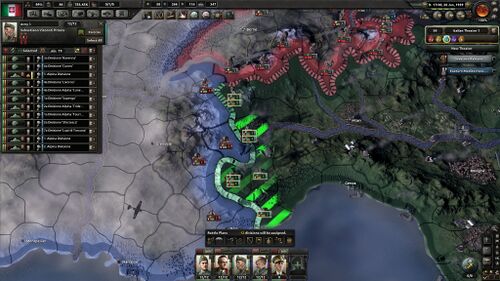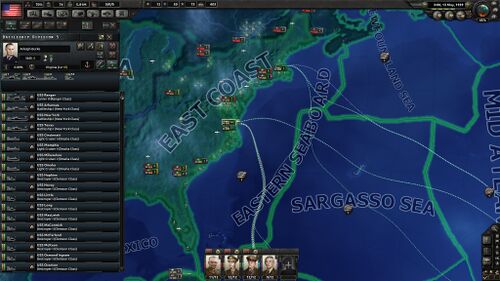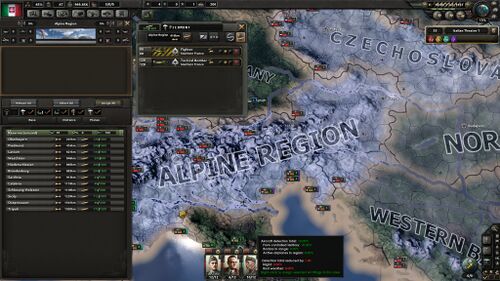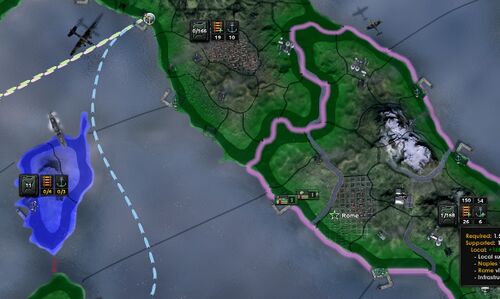本指南的目的是为初玩者浏览《钢铁雄心4》的界面和机制准备。有关用户界面和机制的更多详细信息,包括某些计算背后的详细数学信息,请访问专门针对这些概念的文章进行阅读。
点击“开始游戏”按钮之前
在点击“开始游戏”按钮之前,先熟悉显示的信息,各种按钮和选项的名称以及这些按钮和选项的功能可能是一个好主意。
- 游戏版本:观察显示游戏版本为1.9.3和校验码(四位数)的图形。将已保存的游戏设置为当前正在玩的游戏版本和校验码。如果保存的游戏版本和校验码与游戏版本和校验码不匹配,则保存的游戏将无法工作。请注意,游戏通常是自动更新的,在
 炮手就位 (1.9版本)发布后,1.8版本将不会工作,除非游戏回滚到匹配的版本。这个回滚过程可以在Paradox论坛上找到。请注意,这个过程需要为每个拥有的游戏分支提供一个游戏代码,并且需要一个Paradox交互式帐户来查看这些代码以输入到Steam。
炮手就位 (1.9版本)发布后,1.8版本将不会工作,除非游戏回滚到匹配的版本。这个回滚过程可以在Paradox论坛上找到。请注意,这个过程需要为每个拥有的游戏分支提供一个游戏代码,并且需要一个Paradox交互式帐户来查看这些代码以输入到Steam。 - 设置:点击上方“设置”按钮可以打开设置菜单。此菜单有2大条目:游戏设置和启动器设置。游戏设置菜单可分为:图形、系统、游戏三类。
- 图形:显示模式有三种选择:全屏、窗口和无边框全屏。建议您选择无边框全屏,因为在一些系统上,窗口和无边界模式已经被告知会导致启动问题,如黑屏和启动失败(参考对游戏进行故障排除)。全屏分辨率允许多种选择,如1600x1024、1680x1050等。将游戏的分辨率与显示器的本机分辨率相匹配,通常将会获得最佳的观看和游玩体验。
- 系统:在此您可以选择您需要的语言种类,如果您想体验中文游戏,请选择English。
- 清除用户目录按钮:单击此按钮将清除您《钢铁雄心4》的用户目录。只有当你遇到游戏崩溃时才点击这个按钮。
- 启动器设置:在此您可以选择是否开启“选择退出个性化内容”。
- 创建帐户按钮:点击此按钮创建一个Paradox Interactive帐户。建议您创建一个帐号,这样您就可以在游戏出现问题时获得技术支持。若想登录Paradox Interactive网站,还需要一个Paradox Interactive账户来访问每个游戏之前拥有的分支代码。这是由于《一般资料保护规例》的颁布。其他好处还包括访问错误报告,游戏建议,等等。
- DLC选项栏:点击DLC选项栏“管理DLC”将显示为这个游戏购买的所有可下载内容。每一个DLC旁边将放置一个按钮,如果显示 绿色 表明它已经被启用,相反,没有显示绿色则表示该DLC没有被启用。
- Mod选项栏:点击Mod选项栏“管理mod”将显示一个详细列表,里面包含您所拥有的mod。每一个mod旁边将放置一个按钮,如果显示 绿色 表明它已经被启用,相反,没有显示绿色则表示该mod没有被启用。mod可以从Steam内的创意工坊下载。需要注意的是,有些mod会在游戏过程中关闭获取成就的功能,而有些mod没有为最新版本的游戏进行更新,这可能会导致系统崩溃。阅读作者关于他们的mod的描述通常会写明这个mod是否与成就兼容,以及他们的mod更新到了什么版本。
对游戏进行故障排除
如果游戏无法启动、死机、崩溃到桌面(CTD)或“黑屏”,请尝试下面列出的解决方案。首先列出最常见的原因和解决方案。联系技术支持或访问论坛获得额外帮助。您需要一个Paradox Interactive帐户来取得技术支持。
- 一些杀毒程序会自动阻止可执行文件:尝试添加dowser.exe和steam.exe到防病毒例外列表。
- 过时的显卡驱动程序:尝试下载和安装最新的显卡驱动程序。
- 不兼容的操作系统设置:尝试Windows兼容性设置通过导航到dowser.exe文件(默认的文件路径C:\Program Files (x86)\Steam\SteamApps\common\Hearts of Iron IV),右键单击dowser.exe文件,点击属性,点击“兼容性”选项,并尝试不同的设置。
- 不兼容的显卡设置:尝试全屏运行游戏而不是窗口模式。在游戏启动界面,点击“设置”,打开图形目录。此目录有4个项目:显示模式、显示器、垂直同步和全屏分辨率。显示模式有三种选择:全屏、窗口和无边框全屏,选择全屏选项。
- 不兼容的显卡设置:尝试手动编辑launcher-settings.json文件,首先导航到launcher-settings.json文件(默认文件路径C:\Users\Documents\Paradox Interactive\Hearts of Iron IV\launcher-settings.json)。然后打开launcher-settings.json文件,手动更改文本如下:fullScreen = yes和borderless = no。注意:只更改全屏和无边框文本设置。不要更改或删除其他设置,除非您备份了您的文件,并知道您正在做什么。
- 用户文件损坏:尝试清除用户目录。在设置-游戏目录中,点击“清除用户目录”按钮。然后退出游戏并重新启动它。
- 游戏文件损坏:尝试重新安装游戏。
- 将重要的游戏存档移到备份文件夹中。
- 到Steam,从Steam库中选择Hearts of Iron IV,然后右键选择卸载。
- 导航到C:\Program Files (x86)\Steam\SteamApps\common并手动删除Hearts of Iron IV文件夹。
- 导航到C:\User\(用户名)\Documents\Paradox Interactive并手动删除Hearts of Iron IV文件夹。
- 打开Steam,从Steam库中选择Hearts of Iron IV,然后点击安装,在此期间不要启动游戏!待在steam界面!
- 在Steam上右键点击Hearts of Iron IV游戏,选择属性,点击本地文件选项,然后点击验证游戏文件完整性按钮。这将验证刚刚安装的游戏文件。会看到一条“所有文件都成功验证”的消息。
- 启动游戏时不要开mod。
- 测试游戏。
开始游戏
单人游戏 提供《钢铁雄心4》的单人游戏。所有其他国家将由电脑控制。单人菜单允许玩教程或开始一个新的游戏,以及加载以前保存的游戏。
玩教程可让您快速了解游戏过程,因此强烈建议您使用。完成教程游戏后,它就好像是标准游戏一样,可以继续进行游戏。
多人游戏 允许《钢铁雄心4》的玩家与其他人在线一起玩。最多32名玩家可以在同一时间玩《钢铁雄心4》(当然也包括竞争和合作的多人的游戏)。游戏的主机能够开始一个新的游戏或加载之前的存档。
选项 允许自定义《钢铁雄心4》的声音,外观和游戏细节。这包括显示器分辨率的调整和用户对图形和声音的偏好。第一个选项包含了非常重要的“游戏设置”。
一旦通过基本设置,玩家便可以选择一个剧本和一个国家在游戏时段内进行游戏。
1936年的世界
1936年的剧本从1936年1月1日开始。1936年的情景是最有可能导致第二次世界大战的替代版本的情景,因为它始于更少的联盟或战争。要想在战争开始前完成经济的组织和计划,就必须从1936年开始。这是为军队和战争计划奠定的基础,以生产、科研和外交为重点的剧本。
选择一个国家
每个剧本会显示一个主页面,主页面上有七个主要国家( ![]() 法国,
法国, ![]() 美利坚合众国,
美利坚合众国, ![]() 联合王国,
联合王国, ![]() 德意志国,
德意志国, ![]() 意大利,
意大利, ![]() 日本和
日本和 ![]() 苏维埃联盟) 以及任何在启用DLC后出现的推荐国家。无论选择哪一个国家,都会显示一幅世界地图,以允许多种选择。玩家可以选择他们想要游玩的任何国家,但应该意识到像
苏维埃联盟) 以及任何在启用DLC后出现的推荐国家。无论选择哪一个国家,都会显示一幅世界地图,以允许多种选择。玩家可以选择他们想要游玩的任何国家,但应该意识到像 ![]() 不丹这样的国家可能不是最适合作为新人第一次游玩的国家。我们推荐任何您认为您最了解的国家,或者最有趣的国家!
不丹这样的国家可能不是最适合作为新人第一次游玩的国家。我们推荐任何您认为您最了解的国家,或者最有趣的国家!
Game settings
在正式开始游戏前,你可以在地图的右下角选择进行游戏设置。 你可以通过它去 ironman 和 historical focus ,同时你也可以通过难度进行游戏难度的选择。当然,你也可以选择是否加强一个或多个主要国家/地区(这会让那些国家/地区更加强大)。那里有一个按钮,用于选择是否在游戏中获得steam achievements ,但这需要你选择在铁人模式下,并且选择普通或以上难度。最后,按下右下角的“开始游戏”的按钮,进入游戏,开始一场属于你的二战吧!
Difficulty settings
- 主条目:Difficulty
Players玩家可以选择不同的难度,不同难度下将全局性地对自己/AI进行加强/削弱。 此外,玩家还可以对七个主要国家/地区进行调整,从而仅对一个实体及其所玩的战线进行加强/削弱。
The interface
- 主条目:User interface
对于熟悉Paradox游戏的老玩家,《钢铁雄心4》的游戏界面并不难以上手,屏幕左侧被用来处理大型国家事务,警示标签会显示在屏幕上方用以提示某项事务需要注意,屏幕右侧则是各个部队的信息,在屏幕最上方的信息框中则包括了当局游戏的世界信息和国家信息。
Top Information Bar
Primary map modes
Land Map Mode - Comprises the following three levels of detail and is the mode that will be seen during the majority of game play. Also known as Default Map Mode.
Nations represent the land borders of countries. Interactions with nations occurs within the scope of diplomacy. Nations have names.
A country is built up out of states. Factories, infrastructure, and most other improvements built using Civilian Factories are done at State level. Each state is limited in how many improvements it can have. States also have names.
Within each state are provinces. Interaction with provinces is largely done via land units and a set of constructions that generally aid those units - i.e., forts and naval bases. Provinces do not have names unless they are worth a special amount of victory points and their details are visible in the bottom section of the state overview screen.
There are three other map modes that players use and whose definitions of Region or Area largely ignore national borders and potentially encompass multiple states.
Naval Map Mode - Sea regions of which up to three adjacent ones can be selected when giving orders to naval fleets. Totally independent of the land map mode. Sea regions all have names.
Air Map Mode - Overlays the land and sea map modes. Air bases are assigned operational concern over a given Strategic Region and air wings are given missions. The air base will then have its planes perform their missions within the strategic region. Strategic regions also have names.
Supply Map Mode - Overlays the land map and is divided into Supply Areas. For purposes of the game, while the programmed stats for the various areas are fixed the extent of a given area is determined by occupation of the provinces that comprise the region. They do not have names.
All three of these regions use blue/green/yellow/red border highlighting to indicate neutral/good/moderate/bad conditions in the region relative to either supremacy (land/sea) or sufficiency (supply).
World tension
Main Menu Bar
National information and development
Decisions
The gray button at the top of the screen marked with a gavel (![]() ) opens the Events and Decisions menu. Decisions allow a nation to do special projects such as switching ideology, conducting border wars, banning political parties, censoring the press, excavating for resources, etc. These decisions typically cost anywhere from 25 to 200 political power, except for a few decisions which require no political power at all. Decisions are a middle ground between focus trees and events (allows additional modding and mechanics).
) opens the Events and Decisions menu. Decisions allow a nation to do special projects such as switching ideology, conducting border wars, banning political parties, censoring the press, excavating for resources, etc. These decisions typically cost anywhere from 25 to 200 political power, except for a few decisions which require no political power at all. Decisions are a middle ground between focus trees and events (allows additional modding and mechanics).
Research
- 主条目:Research
The gray button at the top of the screen marked with a flask (![]() ) opens the research menu. There are three or four slots available to research particular technologies, but by pursuing specific national focus ideas the nation may unlock additional research slots, usually up to five.
) opens the research menu. There are three or four slots available to research particular technologies, but by pursuing specific national focus ideas the nation may unlock additional research slots, usually up to five.
There are eleven categories of research. Each nation starts with a historically appropriate level of technology and theory, depending on the scenario.
All the research trees (except for doctrines) are marked along a historical timeline. Researching a technology or unit before their historic year takes longer than it would if researched on or after the historic date. This penalty may be reduced by pursuing certain national focus ideas.
Infantry: researching better infantry weapons and different types of infantry divisions. This is where to go to unlock mechanized infantry, paratroopers, marines, mountain troops and so on.
Support: researching support companies that can be attached to divisions. These include engineers, medics, mechanics, and so on.
Armor: research light, medium and heavy tanks, as well as variant tanks based on the chassis unlocked.
Artillery: researching artillery, anti-tank and anti-aircraft weapons.
Land doctrine: Most of the great powers will start with an initial land doctrine. This may be changed, but all land doctrine paths are mutually exclusive. Each land doctrine chosen assigns its own major combat bonuses.
Naval: researching more advanced warships, submarines, convoy/landing craft and -with the Man The Guns DLC- naval modules used to upgrade ships.
Naval doctrine: Some of the great powers will start with an initial naval doctrine. This may be changed, but all naval doctrine paths are mutually exclusive. The chosen naval doctrine will assign major combat bonuses.
Aircraft: researching different types of fighters, attack planes and bombers as well as carrier borne variants.
Air doctrine: Some of the great powers will start with an initial air doctrine. This may be changed, but all air doctrine paths are mutually exclusive. The air doctrine chosen will assign major combat bonuses.
Engineering: researching electrical engineering for radars (for detection) and computers (for research and encryption bonuses), as well as researching nuclear and rocket technology
Industry: researching means to improve the efficiency, productivity and resource extraction capabilities of the player's country.
Diplomacy
- 主条目:Diplomacy
The gray button with a hand being shaken (![]() ) opens the diplomacy menu. Here is a list of nations and a number of filter buttons to narrow down the list.
) opens the diplomacy menu. Here is a list of nations and a number of filter buttons to narrow down the list.
When the player clicks on a nation to interact with it, this will display a portrait of its leader and a little bit of information about what the nation is up to. In the upper right corner of the menu, one will see a couple of tiny flags with arrows indicating the relationship between the two nations. There are a number of actions one can take in the diplomatic menu, provided the requirements are met. Democracies are especially limited in their abilities to undertake aggressive diplomatic actions unless the world tension meter has climbed to a high enough level.
Hover the cursor over each option for a description of the diplomatic action and what conditions must be met.
Trade
- 主条目:Trade
The gray button with box and curved exchange arrows (![]() ) opens the trade menu. The player will see a number of tabs and columns listing the major resources available, what is required and possible trading partners.
) opens the trade menu. The player will see a number of tabs and columns listing the major resources available, what is required and possible trading partners.
There are six major resources in the game: oil, aluminum, rubber, tungsten, steel, and chromium. These are used to help in the construction of tanks, battleships, planes and so forth. Each new production line of a major weapon system will require a certain amount of resources. Though one can build these units without the necessary resources, production will be much slower and less efficient.
Resources are found in certain locations on the map and are not evenly distributed. One will almost always have to trade for what one needs.
To trade for a resource, click on the name of the country and move the slider to determine how much one is trading for. Resources are typically traded in units of 8. Each trade, unless conducted over land, requires a minimum of 1 convoy vessel plus additional convoys depending on naval distance and total quantity of resources.
Every 8 units of a resource one imports will also cost a civilian factory, with that productive power going to the nation that is being traded with. Therefore, exports will make a country's industry stronger as civilian factory "power" is pulled from other nations, but a lot of imports will make a country weaker due to the loss of civilian factory "power". However, it may be necessary to import resources to keep the war machine running at optimal efficiency. Tip: trading with puppets gains considerably more than 8 resources per civilian factory traded.
Construction
- 主条目:Construction
The gray button with the excavator (![]() ) opens the construction menu. This is where one will assign tasks to civilian factories - building infrastructure, new factories, defenses, and so on.
) opens the construction menu. This is where one will assign tasks to civilian factories - building infrastructure, new factories, defenses, and so on.
Civilian factories make all the improvements to a State. The number of factories available for construction will depend on the size of the nation, how many factories are being dedicated to providing consumer goods for the country's population (Economy Law), and how many factories have been “traded” for strategic resources. The amount of civilian factories can be increased by building more, but be careful since each State can only support a certain number of productive structures. A maximum of fifteen factories will be devoted to a construction project, and any left over will work on the next item in the queue.
There are three categories of structure that can be built with civilian factories.
State structures
These constructions ![]() improve the state without using up one of the shared building slots. Instead, each type of improvement here has its own level and maximum.
improve the state without using up one of the shared building slots. Instead, each type of improvement here has its own level and maximum.
 Infrastructure: Each state has an infrastructure rating that determines how easy it is to supply units in the state, how quickly military units can move through the state, how quickly shared buildings can be constructed, and increases resource output.
Infrastructure: Each state has an infrastructure rating that determines how easy it is to supply units in the state, how quickly military units can move through the state, how quickly shared buildings can be constructed, and increases resource output. Air base: The larger the air base, the more planes it can effectively field. Air bases house military aircraft.
Air base: The larger the air base, the more planes it can effectively field. Air bases house military aircraft. Construction#Anti-air: Helps defend a state from enemy aircraft attempting to strategic bomb installations such as refineries, factories, infrastructure, etc.
Construction#Anti-air: Helps defend a state from enemy aircraft attempting to strategic bomb installations such as refineries, factories, infrastructure, etc. Radar station: Helps the air force detect and engage enemy air wings, increases detection of nearby enemy fleets at sea, and gains intel on enemy troops in nearby states.
Radar station: Helps the air force detect and engage enemy air wings, increases detection of nearby enemy fleets at sea, and gains intel on enemy troops in nearby states.
The number of shared structures ![]() that can be built is limited by the number of slots available in that State. The number of slots can be increased by researching Industry technologies. Some National Focuses also add extra slots in specific states.
that can be built is limited by the number of slots available in that State. The number of slots can be increased by researching Industry technologies. Some National Focuses also add extra slots in specific states.
 Military factory: Used to produce weapons, equipment, planes, and vehicles.
Military factory: Used to produce weapons, equipment, planes, and vehicles. Civilian factory: Used to produce and improve a nation's military/industrial capacity.
Civilian factory: Used to produce and improve a nation's military/industrial capacity. Synthetic refinery: Produce synthetic oil and rubber, especially useful to nations that lack either.
Synthetic refinery: Produce synthetic oil and rubber, especially useful to nations that lack either. Naval dockyard: Used to produce ships and convoys. Can only be built in coastal states.
Naval dockyard: Used to produce ships and convoys. Can only be built in coastal states. Rocket site: Locations from which to produce rockets and to launch rocket attacks on nearby nations.
Rocket site: Locations from which to produce rockets and to launch rocket attacks on nearby nations. Nuclear reactor: Produces nuclear weapons.
Nuclear reactor: Produces nuclear weapons.
Province buildings
Province buildings ![]() are built on the smallest territory size in HoI4, the province.
are built on the smallest territory size in HoI4, the province.
 Naval base: Stations and repairs naval fleets, and can send and receive supplies and resources via convoys. Each naval base level increases supply capacity and supply throughput.
Naval base: Stations and repairs naval fleets, and can send and receive supplies and resources via convoys. Each naval base level increases supply capacity and supply throughput. Land fort: Inflicts an attack penalty of -15% for each fort level on the attacker in combat. Attacking from multiple directions will reduce forts effect.
Land fort: Inflicts an attack penalty of -15% for each fort level on the attacker in combat. Attacking from multiple directions will reduce forts effect. Coastal fort: Inflicts an attack penalty of -15% for each fort level on the attacker in naval invasion combat.
Coastal fort: Inflicts an attack penalty of -15% for each fort level on the attacker in naval invasion combat.
Production
The gray button with the wrench (![]() ) opens the production menu. This is where military factories and dockyards are assigned to build equipment, army vehicles, aircraft and ships.
) opens the production menu. This is where military factories and dockyards are assigned to build equipment, army vehicles, aircraft and ships.
The more factories one dedicates to building a specific item, the more will be produced. Infantry, armor and artillery units made will then be assigned to the appropriate military divisions, either for new units being constructed or reinforcement and upgrades for units in the field. Excess equipment is left in the national stockpile. Airplanes produced will be deposited into a reserve pool. Naval units will be automatically placed in the highest level naval base, though one can assign a port or fleet if that would be preferable (recommended for the Soviet Union so they don't end up with all new ships stuck in the Black Sea).
Factory output is dependent on the availability of strategic resources for higher end units, and on the efficiency cap of a country's industry. New production lines will take time to be perfectly efficient, and if one adds factories to a production line, some of that efficiency will be lost. The factory productivity and efficiency can be improved in the Industrial research tree.
Recruit and deploy
- 主条目:Army planner
The gray button ![]() with the tank opens the army planner menu to recruit and deploy units. This is where it is decided what types of divisions are to be trained. These divisions will be filled by the equipment and vehicles built in the production menu. What is required to complete a new unit is shown by hovering over the green progress bars.
with the tank opens the army planner menu to recruit and deploy units. This is where it is decided what types of divisions are to be trained. These divisions will be filled by the equipment and vehicles built in the production menu. What is required to complete a new unit is shown by hovering over the green progress bars.
The country starts with a few default divisions that can be built. Army experience can be spent to design a new division template or edit ones that already exist.
The game starts with reinforcement and upgrades given equal weight with the creation of new units. If it is preferable focus the energy of new tanks or artillery on fresh units, instead of trickling equipment to the field, reinforcement priorities can be set on this screen as well.
Logistics
- 主条目:Logistics
The gray button ![]() with the paper and pen opens the logistics menu. This menu gives an overall summary of stockpiled equipment, whatever shortages the country might have, as well as a rundown of how many strategic resources the country is missing from the production lines.
with the paper and pen opens the logistics menu. This menu gives an overall summary of stockpiled equipment, whatever shortages the country might have, as well as a rundown of how many strategic resources the country is missing from the production lines.
Controlling the army
- 主条目:Warfare
The player can move their units by selecting them with the left mouse button and then clicking their destination with the right mouse button. If one draws a box around a group of units using left click and drag, all units inside the box can be commanded. One can move troops across the ocean to friendly territory, by sending the units to a province with a naval port and then shift-clicking on a destination port. For an overview of all divisions, including indications of their combat status, click on the Army View icon under the date or press hotkey "o". Right-click on a division's info bar to pan over to it or hold down shift and left click on multiple units to select them all.
Troops are more effective when they are grouped into armies under a commander's command and given plans to execute.
Creating command groups/armies
- 主条目:Commander
The player can create armies of units by selecting a group of them and then clicking on the silhouetted portrait or green plus sign that one will see at the bottom of the screen. Then, go to the selected unit profile in the upper left and click on the silhouetted portrait. This will open up the list of generals to be assigned to armies. There are two types of military leaders – generals and field marshals, both of whom can normally only effectively command 24 units; but some up to 32. Commanders may also have attributes that give them bonuses in certain types of combat situations. If one promotes a general to field marshal, they lose their attributes (except "old guard") as field marshals have different attributes.
Experience and giving orders
Countries will gain army experience mostly through combat, but one can start a trickle of early experience by having soldiers "exercise". To do this, select the army group and, in the unit profile in the upper left of the screen, click the exercise button in the upper right of the menu. Be aware that this results in higher equipment attrition, which may not be desirable as a country with limited industrial capacity.
One can spend experience to promote generals and allowing them to lead more troops, or to create and edit new division types in the unit production menu.
An army group can be commanded like any other group of units and simply giving a right-click move order to a destination. However, they will fight better if they are given "battle plans" – a general order that is coordinated along a front, either to advance or defend.
When the player selects an army group, they will see a row of general orders appear at the bottom of their screen. Each of these has rollover text that explains in detail how to use this instruction. This guide will focus on the most important ones.
Naval invasion: Use this for amphibious attacks on enemy territory. (One can move into friendly territory this way, but it is more efficient to simply use port to port movement as described above.)
When one selects naval invasion, one will be asked to left-click on an origin point. This is where the army will gather for the assault. Right click on the enemy province one wants to invade. Note that one will need to have some naval intelligence of every sea lane they will be crossing, so one will have to have warships patrolling or hold naval superiority in those sea areas.
All plans take time, and amphibious invasions take a lot of time to plan. Once the weeks (or months) of preparation are ready, the grey arrow above the army group will turn a faded green. Press that arrow to activate the plan.
Land operations: To make a battle plan for offensive land operations, one must first define one's defensive front – this is the point from which the army group will begin their operations. Select the defensive front button and, on the map, draw a line to indicate where an army group will start. (In many cases, this will be a national border or the current line dividing enemy armies). Then, click the offensive front button (a line with an arrow) and draw the front to where the armies should advance.
The army group units will begin to organize themselves along their defensive front. When they are in place and one is ready to begin, press the green arrow and the units will begin to execute the plan.
One can research doctrines and hire advisors that will reduce the time for a military plan to be prepared or add bonuses to units that are operating with a plan.
Ships will be automatically grouped into fleets at ports as they are constructed. If one does not like the way fleets are organized, one can drag-and-drop silhouettes of ships from one fleet to another.
Assign commanders to one's fleets by clicking on the silhouetted portrait and choosing from available naval commanders. You may recruit new admirals for the fleets. Like generals, admirals may have skills that are assets in particular battle situations or while commanding certain types of vessels. Admirals normally have a maximum amount of 10 ships to lead.
If a fleet is selected, a row of different orders will appear above it. These range from simple patrol missions to convoy escort duty. Choose a mission for the fleet (submarines, for example, are best used to interrupt convoys), and then right-click on up to three contiguous sea zones, i.e., sea zones that touch each other. This fleet will then carry out that mission over these areas. One can remove these orders by returning the fleet to port and assigning a new mission.
So long as a fleet is operating in a sea zone, enough intelligence should be gathered about that zone to both route supply overseas through that region or to order an amphibious assault across that space, but if the enemy is active in the region, naval superiority is also required.
Controlling the air force
- 主条目:Air warfare
Unlike other units, airplanes that are constructed are sent to a reserves hangar. One can mobilize them by clicking on an air base, then creating an air wing using the button to the upper right of the resultant menu (it has a plus sign). The larger the airfield, the more planes it can efficiently use.
Like naval units, air units operate over regions and are given specific missions relevant to the type of aircraft. Fighters can do air superiority or interception, strategic bombers can target industry or infrastructure, tactical bombers can do close support of land attacks, and so on. To assign an air wing to a region and a mission, click on an air field. This will open the air information map mode.
Left click on an air wing and then right click on the region where it should operate. One can decide what mission it will perform. Planes have limited range depending on their type (strategic bombers have a much greater range than interceptors) and design (dependent on technology researched or experience spent to edit their abilities).
Supply
Armies in the field will require supplies to remain in fighting shape. An army out of supply can take no offensive actions at all, including simple movement, even if unopposed. Supply is determined on a territorial basis (i.e., potentially larger than a single State) where each territory is able to support a specific number of troops. However, the final value of this supply to an actual unit is modified by the infrastructure of the State the unit is stationed within. If a territory can support 10 units easily, but if the army is in a province with very low or damaged infrastructure, a supply bottleneck will develop, so not every unit in that army will get what it needs.
Supplies coming over land are also provided by adjacent territories - which forms a supply line back to the capital or an alternate territory if the capital territory is not in one's control. This is why it is particularly important to maintain and defend contiguous States between home and the front lines.
When land paths are unavailable supplies will be transported via sea. Overseas supply is done through convoys and sea ports. Larger ports can funnel more supply across the ocean, though this will also require more convoy ships. For overseas convoys to be most effective, one will need to assign some of one's naval vessels to Escort duty in the regions that they will cross.
The player can check the supply lines and capacities by clicking on the Supply map mode in the menu to the lower right of the main screen.
Special weapons
If all three nuclear technologies (Atomic Research ![]() , Nuclear Reactor
, Nuclear Reactor ![]() , Nuclear Bombs
, Nuclear Bombs ![]() ) have been unlocked and at least one nuclear reactor
) have been unlocked and at least one nuclear reactor ![]() has been built, then you will slowly acquire nuclear bombs. To deliver a nuclear bomb the player must use a strategic bomber and have at least 75% air superiority over the strategic air region of the target province. Select the province one wants to attack and press the nuclear strike icon in the lower left of the province information menu. A nuclear bomb will destroy most of the infrastructure and industry of the target and will damage any units in that area.
has been built, then you will slowly acquire nuclear bombs. To deliver a nuclear bomb the player must use a strategic bomber and have at least 75% air superiority over the strategic air region of the target province. Select the province one wants to attack and press the nuclear strike icon in the lower left of the province information menu. A nuclear bomb will destroy most of the infrastructure and industry of the target and will damage any units in that area.
If one researches both Experimental Rockets ![]() and Rocket Engines
and Rocket Engines ![]() and also builds a rocket site
and also builds a rocket site ![]() , then Basic Guided Missiles
, then Basic Guided Missiles ![]() may be launched at distant States to damage their infrastructure. The main advantage of guided missiles is that they cost zero production and zero resources and do not tie up any military factories. Instead, guided missiles are automatically produced at each rocket launch site at the rate of one every 24 hours. Rocket sites have a maximum capacity of 100 guided missiles which means that the launch site will be totally filled at the end of 101 days assuming no missiles have been launched. Further research into Improved Rocket Engines
may be launched at distant States to damage their infrastructure. The main advantage of guided missiles is that they cost zero production and zero resources and do not tie up any military factories. Instead, guided missiles are automatically produced at each rocket launch site at the rate of one every 24 hours. Rocket sites have a maximum capacity of 100 guided missiles which means that the launch site will be totally filled at the end of 101 days assuming no missiles have been launched. Further research into Improved Rocket Engines ![]() and Advanced Rocket Engines
and Advanced Rocket Engines ![]() allows rocket sites to manufacture and launch Improved Guided Missiles
allows rocket sites to manufacture and launch Improved Guided Missiles ![]() and Advanced Guided Missiles
and Advanced Guided Missiles ![]() respectively. At present it is not possible to launch nuclear bombs using rockets.
respectively. At present it is not possible to launch nuclear bombs using rockets.
Capitulation and winning the war
|
|
这部分内容可能已不适合当前版本,最后更新于1.5。 |
Once a country has lost owned territory above a certain threshold that depends on its war support, it will capitulate. All divisions they own in their core or occupied territory will be disbanded and their core territory will be instantly occupied by the aggressor, but they carry on as a government-in-exile and keep control of their colonies (non-core provinces) - for example, the Netherlands keeps control of the Dutch East Indies. Partisans in occupied territory will continue to be a problem as long as the country's fellow faction members carry on the war - after all, they can still hope for liberation.
If more than one country is fighting on the losing side of the war, the entire faction will surrender when the last major country in it surrenders (you can see which countries are considered majors on the world diplomacy screen). When this happens, the game will pause and a peace conference will begin. The peace conference proceeds in stages based on the war effort expended by the victorious powers. So, for example, if the Allies defeat Germany and the United States achieved the most in the war followed by the United Kingdom, the United States will have the first chance to make demands on the Germans, followed by the United Kingdom. Then, the next most significant victor(s) will make their demands.
This continues until all the victors are satisfied with the peace, all available demands have been made or no nation can afford to make additional demands on the defeated powers.
War demands have a cost, and this cost is deducted from the war score of the victorious nation. Some demands, like making a nation a puppet, require having that as a wargoal unless the rules of the nation allow puppeting without a war goal.
Tips to getting started
As the player is learning Hearts of Iron IV, remember these important steps as one formulates their plans for world domination.
- One will start the game with a few production lines of weapons already active. The most important of these will be one's infantry equipment, so, until more military factories have been built, put most of one's energy here.
- When a country is training new divisions, have multiple lines of infantry going at once. If one doesn't, one will fall behind in army size.
- Plan out National focuses early in the game. For instance Germany will want to move quickly along the paths that give it claims on Austria and Czechoslovakia. The USA will need to get itself out of the Great Depression. France has to watch its political stability. Have a long term goal in mind. Keep in mind you don't have to research all the National Focuses one after another. Sometimes it is best to wait a bit for the opportune moment, especially with research boosting focuses.
- Each nation has access to extra research slots if they activate specific national focuses. These are easily identified by the beaker icons on the names (though some focuses with that icon give research bonuses instead - read the tooltips for details). The sooner these are unlocked, the better the army will fight.
- When researching, try not to rush too far ahead since there are significant penalties to pursuing technology too early in the timeline. However, if one researches computing in the electrical engineering track, one can reduce their total research time by a significant margin.
- If a powerful navy is not central to one's war plans, one can usually ignore this aspect of the war and research tree. However, convoys are always useful for trade and supply, so have whatever dockyards owned should focus on that.
- If one is at peace, armies should exercise so they can train until they reach regular status and earn experience. Adding an extra regiment, line battalion, or support company to an existing division design is an easy way to beef up one's forces – unless one doesn't have the equipment on hand to reinforce what one has.
- In wartime, it is often better to let the new equipment fall into the hands of new units instead of reinforcing and upgrading old ones. Adjust the reinforcement and upgrading of troops with an eye to what one needs now – more active units in the field now or a stronger punch in a few months time.
- Democracies should change their economic ideas as soon as they can in order to free up civilian factories that are otherwise dedicated to producing civilian goods.
- Don't forget to rest armies after they have reached their objectives. A few days of inaction will help with organization, reinforcement and supply.
Advanced Tips
- Remember infrastructure and fortifications. Should one be attacked, a line of land forts and a battle plan for a defensive hold along a strategic line (like mountains or a river) could give the player time to hold off an invasion as he waits for help from allies and/or their own reinforcements.
- If you lack a resource, but produce it locally (i.e. steel is produced, but not enough of it), try to avoid trading for it unless absolutely necessary. You can research excavation under the industry tab, which will increase the amount of your produced resources by 10% for each tier, up to 50% bonus if all tiers of excavation are researched. This will free up your civilian factories from trade and allow you to construct more buildings.
- When there is a lack of material, remember to check what is being produced. It won't do to have too many different recruits going at once (i.e both motorized and infantry) if what the factories are producing is going toward upgrades. An example would be to trim away motorized infantry for a while and focus on just regular infantry. If one lowers the production of motorized and focus that on upgrading an existing unit, the free factories can be moved to infantry equipment and by extension allow for the production of more units.
- When Manpower is low, remember to change your conscription law and try attaching Field Hospitals as support companies or disbanding units you don't need, including air wings and ships. If you must maintain a large front and can't afford to reduce the number of divisions you have, you can consider making them smaller. Quite often you can afford to remove one infantry battalion from your default divisions and they will perform almost the same. Keep in mind that the Total Mobilization (Economy Law) gives you -3% recruitable population and generally isn't worth having, unless you can spare the manpower. The Mobile Warfare and Mass Assault Land Doctrines, as well as the Nationalist branch of the general National Focus tech tree give bonuses to your manpower pool. If you have concerns about your manpower in the long run, consider creating high-tech divisions with advanced equipment. Higher production cost is generally linked with manpower preservation - an infantry division will lose a lot more manpower than a mechanized division. Mountaineers and Marines will save you a little bit of manpower, compared to regular infantry, if deployed properly in their respective fields, due to their combat bonuses in mountains/hills and river crossings/naval invasions, as well as their slightly higher breakthrough stat, and they only cost more Infantry Weapons and training time to produce.
- Doctrines should be picked carefully and with consideration. It is possible to switch from one doctrine to another, should the need arise, but it takes a long time to research them and you will lose the old doctrine. The good part about doctrines is, that they don't require production and the bonuses come into play as soon as you research them. There are about 10 separate researches in Land Doctrines, 12 in Air, and 15 in Naval. The base cost is 200 days for Land Doctrines/Air Doctrines and 250 days for Naval Doctrines, so it will take considerable time to replace a fully researched doctrine. Use caution should you decide to make drastic changes.
- Remember to update and research and produce the next tier of equipment for units you find lacking in quality. Sometimes an upgraded version of a unit has a lot more hidden bonuses than one might expect.
- Different Factions have different disadvantages and advantages when it comes to securing resources. The Allies begin with the majority of Rubber production, and anyone going to war with them will have serious troubles with securing rubber without a plan to attack Allied South-east Asia, or without a lot of Refineries. Rubber is needed for all aircraft, as well as motorized/motorized artillery and mechanized. Most of the world's Chromium can be found in the Soviet Union, Turkey, South Africa, France, Cuba and Yugoslavia. Chromium is needed for ships and heavy tanks, as well as modern tanks. The only ships that don't require Chromium are Destroyers I-III, Light Cruisers I-III, Heavy Cruisers I-III, Submarines I-III. If you want to maintain a fleet of capital or modern ships, you will need to secure those places for yourself, or as allies. Aluminium can be found in France, the United States, Hungary, the Soviet Union, and Yugoslavia. Aluminium is needed for all aircraft, as well as support equipment. When planning your strategy you have to plan to either skip mass production of units requiring resources you don't have, or to plan to steal those resources from the enemy to secure your production or deny the enemy production of a particular equipment type. If you are playing as a minor nation, you might want to consider which side to join, if any, depending on the resources you will need to power your economy.
- Naval and Air combat seem confusing at first, but with a bit of research and understanding, turn out to be simpler than Land combat. Look up an in-depth guide if you have problems with Air or Naval battles and/or strategy.
hoi4de:Beginner's guide hoi4es:Beginner's guide hoi4fr:Beginner's guide hoi4pl:Beginner's guide hoi4pt:Beginner's guide hoi4ru:Beginner's guide
